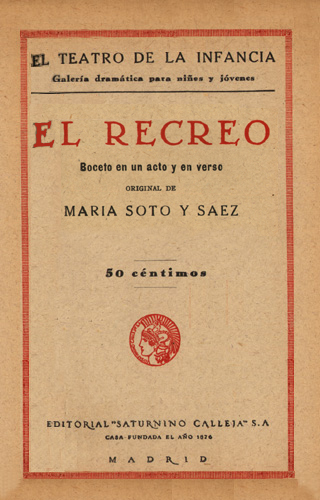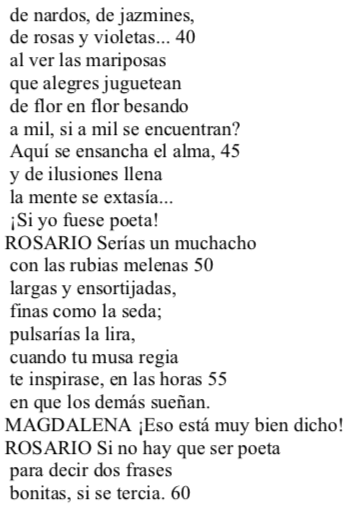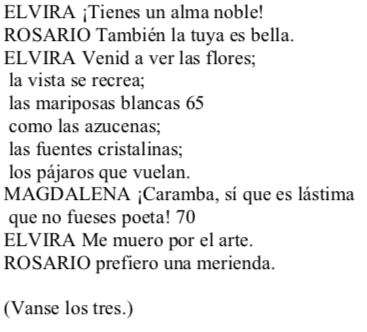A beautiful milestone has ocurred today: we’re finally profiling our first foreign language playwright! It is also the first time we profile the author of plays for children.
Her name is María de Soto y Sáez and she truly is exceedingly unknown.
Paraphrasing from the only bio I could find, her birth and death dates remain unknown. She was active in the late 19th Century and early 20th Century in Spain and there are at least six works that she authored.
Her first play, El robo de anoche [The Theft of Last Night], survives in manuscript form.

It’s possible this play was never performed (something this play has in common with 95% of my plays…teeheehee). The play was written around 1890.
On December 6, 1890 she had a one-act play, La Esperanza [The Hope] debut at Teatro Variedades in Madrid. The comedic plot concerned jealousy in a marriage and relies on puns and misunderstandings for its source of humor, which would probably qualify it for an Amazon series now, but would still be light years funnier than the worst sitcom birthed by Satan. The play was subsequently published by José Rodríguez.
It’s possible she co-authored a play, Don Juanito, under the pseudonym of Modesto Aria –


In 1909, the prominent printer Saturnino Calleja y Fernández printed six of Soto’s works together in one volume, El teatro de la infancia [Childhood Theatre]. All the plays are one acts, in verse, and for children. The volume consists of:
La banda de honor [Sash of Honor] – One act. Kids competing for a “sash of honor.”
El manojo de claveles [The Bundle of Carnations] – One act comedy.
El Portal de Belén [The Entrance of Bethlehem] – One act drama, in verse.

El recreo [The Recess] – One act comedy. Verse. Kids hanging out at recess.
El Día de Año Nuevo [New Year’s Day] – One act comedy.

La revoltosa [The Troublemaker] – One act comedy. Verse. An interesting study of the title character but also the kids who surround her.
This is pretty much all that’s known about this author.
Several of her youth plays were also published again in Chile. This has led some Chilean sources to suggest Soto y Sáez was a Chilean author. This doesn’t appear to be the case, but with what little is known about her, she may have been.
From these one acts, we’ll profile two: The Sash of Honor/La banda de honor and The Recess/El recreo.
The Sash of Honor’s plot is pretty dang straightforward: Set in a school for girls, apparently a school for excessively cruel girls, all the girls want the sash – for which they have to be examined by a panel of teachers. Most of them are arrogant, except for poor, humble Carmela, who prays and also has a rich, kind friend in Rosa who helps her gain confidence and, and, [spoiler alert] – wins the sash!
It’s like Mean Girls set in a Spanish Catholic school in 1909.

HIGHLIGHTS:
- There are parts for eight girls here. And no boys. Hehe.

- There are some genuinely funny bits in the play.
- It’s in verse, specifically silva arromanzada. For those heavy into meter, these are lines, usually between 7 and 11 syllables, including 7 + 7 alexandrine schemes and assonant rhyme in even lines. All for a children’s play. Thank you to Professor Enrique Gil Miguel for helping me with this and thanks to my playwright friend Beatriz Cabur for introducing him.
- It tackles the subject of bullying.
LOWLIGHT:
- It’s kinda cheesy and simplistic.
OTHERLIGHT:
- It’s exceedingly Catholic. Modern schools may welcome that, others not so much.
Let’s do a walk-through of this play. Before we start, translating Spanish isn’t something I do every day and I want to thank my friend and fantasy writer (and Spanish speaker) Kristin Jackson for answering all my questions. Nevertheless, any mistakes in this translation are mine and mine alone. I tried to convey the meaning while maintaining some semblence of faux-poetry. I didn’t attempt a silva arromanzada.
Carmela is lamenting the fact that everyone is mean to her, but she has Rosita’s friendship:
(I cut some stage directions for fun)


Scene IV
Carmela
I do nothing to them, oh my!
They make me upset …
Nobody has affection for me.
Except Rosita, Yes she
the most noble, who is a duchess,
the richest and most elegant,
That speaks to me so happily
and she even hugs me and kisses me.
I do not know what I would give
for being able to pay
She knows how to treat well
Those who were born poor.
[break]
My God, if I go wrong
How they are going to laugh! (kneels before the image of the Virgin)
To you, blessed Virgin,
day and night we acclaim you,
before you we prostrate ourselves,
and fix our gaze on you,
we ask in the affliction
the same as in joy,
May you be, Virgin Mary,
always our salvation.
(At the end of the last verse appear behind Clara, Luisa, Paca and Sofia mocking her)
Now the bad girls, aka demonic hellions, show up.

Scene V
Carmela, Luisa, Paca and Sofia
Clara. Look at the poor thing’s fear
Paca. Pray, girl, pray,
God does not hear you
Sofia. You win a prize?
Luisa. What a shame!
Paca. Poor thing!
Clara. Do not make yourself up …
Sofia. Don’t deceive yourself …
Clara. You do not know anything …
Paca. You’ve been a fool …
Clara. You should leave
before they see you.
Paca. With that dress
You are going to get hit …
Sofia. Poor girl.
Luisa. But how poor!
Carmela. But, my God,
I have to put up with this! (cries)
Clara. How fragile!
Sofia. No, girl, do not cry!
(the four of them surround her, mocking her)
Carmela isn’t having the best day.
But then, her pal Rosa shows up and DISHES IT OUT!

Scene VI
[Others from before] Enter Rosa, from behind.
Rosa. What’s this, why do you enjoy yourself?
in bothering Carmela?
That is not worthy, nor is it noble,
nor good friends.
Clara. She has such a sad face!
Sofia. That seems to be punched ..
Paca. Or her cat has died …
Rosa. Shut up and go outside.
Clara. Whose order?
Rosa. Mine,
and woe to the one who does not obey …
Luisa. Well, she’s fuming! …
Clara. As the daughter of a duchess!
(The four exit.)
Carmela, despite being high-born (a duchess or daughter of a duchess) is kind and warm-hearted to the poverty-stricken [apparently] Carmela. She even gives Carmela a beautiful necklace to wear at the competition…
Later Rosa tells us exactly how the examination goes –


Rosa. You will see. She came in and, waving
to the audience,
it was before the teachers
Waiting for them to speak to her.
She firmly replied,
without hesitation, with a clear voice,
admired by the whole world
for her sweetness and her grace.
There were many questions.
difficult, risky,
the schoolgirl replied to
all with aplomb
And seeing such a brilliant test,
the court stood up
Until she walked to them
after congratulating her,
and lavishing Carmela
a thousand words of praise on her,
On her noble chest she puts
as a great prize the sash.
All hands applauded her
before the exciting act,
and everyone congratulated her
and all admired her.
And look, the classmates
that mocked her before,
in triumph until here they bring it.
and one after the other they embraced her.
Yay for Carmela! Sadly, the mean girls weren’t boiled in oil at the end. Our next play is The Recess. The summary of this play is basically kids hanging out at recess.

HIGHLIGHTS
- An all-girl cast. No boys allowed. Large cast of 14. How fun is that?

2. Positive messages about appearance and body image. More on this later.
3. Very in-depth characterization.
4. Still in verse.
5. A lot of the play is like a series of monologues, with several characters getting their own solo pieces.
6. Ample use of humor.
LOWLIGHTS:
- That in-depth characterization comes at a price, namely plot. The closest thing to a plot is Paca/Paquita’s struggle with Sagrario over Sagrario’s slavish fawning over the mirror.
OTHER LIGHTS:
- Still very Catholic.
We’ll take a brief cruise through this play. Again, I want to thank Professor Enrique Gil Miguel, my playwright friend Beatriz Cabur and my fantasy writer friend and Oaxaca native Kristin Jackson.
Again, if the translation sucks, it’s my fault.
The play opens with the recess bell. In scene 2, we see Elvira has a poetic streak, but her friend Rosario has other things on her mind. This is some of that characterization I mentioned.



ELVIRA
What beautiful flowers!
The view is refreshing!
Delightful gardens,
Who does not dream to see you?
MAGDALENA
You feel romantic.
ELVIRA
And who didn’t feel so
on hearing the chirps
of those birds that fly;
by breathing the air
that comes embalmed with
of tuberoses, of jasmine,
of roses and violets …
to see the butterflies
how happy they play
Kissing from flower to flower
a thousand, if a thousand are there?
Here the soul widens,
and full of illusions
the mind was ecstatic …
If I were a poet!
ROSARIO
You would be a boy
with blonde ringlets
long and curly,
fine as silk;
you would play the lyre,
when your governing muse
inspires you, in the hours
in which others dream.
MAGDALENA
That is very well said!
ROSARIO
You do not have to be a poet
to say two pretty sentences,
If you’re stubborn.
ELVIRA
You have a noble soul!
ROSARIO
Also yours is beautiful.
ELVIRA
Come see the flowers;
the view is refreshing;
white butterflies
like the lilies;
the crystal-clear springs;
the birds that fly.
MAGDALENA
Wow, it’s a pity
that you were not a poet!
ELVIRA
I die for art.
ROSARIO
I prefer a snack.
(All three exit.)
“You go do your poet stuff, beatnik. I wanna eat.” I like Rosario’s style.
Later in the play, we learn that Sagrario is obsessed with her looks in particular and mirrors in general. We also learn that Paca hates mirrors. She tries to convert Sagrario to non-Mirrorism. The conflict arises.

PACA
I want to take away that vice,
which is very ugly, dear Sagrario.
Holy and good that you, in fixing yourself,
you study yourself alone in your room,
and ask the mirror for advice
to thus enhance your charms.
And once you get an answer
and be as beautiful as a day in May,
you do not remember that there is a mirror
Don’t worry about bows and ribbons.
The woman who is honest and simple,
is the angel that God has created
to do what in his eyes of glory
is considered in a clearer mirror.
And having that mirror in your eyes,
it’s not good to see it in your hands
a mirror that is worth very little
compared to the one I talk about.
But there is something deeply pathological about Paca’s mirror-vengeance. As we learn through more characterization:
PACA


PACA:….and it produces dislikes
Like someone gave me once and I won’t forget it
And it was a day that I, playful
and greedy, I took out of a closet
a large jar of sweet syrup
that I had long ago besieged.
And that seeing the square undefended
I decided to attack,
and capture it without them knowing
because nobody came to save it.
I had eaten at least
More than half of that jar,
When I heard a … Holy Virgin! and my eyes
they turned and, speechless with horror,
reflecting, they looked at my image
in the mirror of a golden frame,
so grotesque, so sad and ridiculous,
that until this time I have not forgotten it.
And my mother following me,
and my afflicted face and my lips
all filled with sweet syrup
that the mirror inhumanely reflected.
I fell at the foot of my mother, tearful,
promising not to do such a sin,
and throwing the mirror
It cracked into 20 pieces like sabers.
Since then, seeing a mirror
I look at it on two or three sides,
and bringing my mouth to her mirror
I repeat furiously … What a fake!
And that’s why I want that she
not look in the mirror anymore,
that I have declared war
on mirrors of all sizes.
(Exit.)
Even though Paca is helping her friend, she has some serious latent reasons why.
Later Emilia tells a story about a grandpa, boy and donkey.
Summarizing the story: When the grandpa rode the donkey and the boy walked behind, the villagers said it was too cruel to make the boy walk. They switched. When the boy rode and the grandpa walked to the next village, the people said how cruel to make the grandpa walk. So they both walked and the next village told them how sad it was that the donkey didn’t have a load, etc. The point being people will complain no matter what you do. (Good point)
Then Emilia tells Amparo the evils of slander, using old snowball/sun metaphor:

EMILIA
It is envious like slander,
as a snowball that, unsuspecting,
they are making, so that they
those who only hurt the world
enlarge it
But the Sun, shining in the sky,
he undoes it with its pure rays,
and it turns into foam bubbles
what bad hands had made.
See how they all went
when they have seen how I speak to them.
The truth is bitter to the people,
who in the world live with deceit.
(Very slowly the last quatrain, after which she wraps the waist of AMPARO with her arm, and they disappear slowly.)
It seems Emilia really, really likes Amparo.
Meanwhile Amelia and Teresa have a scheme worked out where Amelia cheats for Teresa in exchange for candy.
Towards the end, Sagrario has learned her lesson about looking in the mirror and society’s treatment of women.

We live to please,
since we are born,
and the kindness of girls
It is a gift from heaven.
If you chatted to your devil
your false mirror,
it was to correct you
by that means.
(She takes out the mirror and brings her face closer to PAQUITA’s, making her look at it at the same time as her.)
I love you, girl
how I love you …;
look with what affection
They send us a kiss!
(They both smile in the mirror and go arm in arm.)
Looks like Sagrario and Paquita are the best of friends.
The following scenes do a brief wrap up, the bell rings and recess is done.
In preperation for this I also read La revoltosa and parts of Don Juanito.
There’s no evidence of these plays ever having been performed.
In writing for children, Soto’s has several themes in common: the plight/situation of girls in school, the role of religion and humility rewarded and there are some vicious, vicious girls in Spanish schools circa 1910.
I’m not sure what relevance these plays would have to a child of today. Perhaps some of the monologues could be used/adapted for an actor wanting to do a legit period piece.
However, these plays offer an interesting glimpse into children’s theatre in the early 20th Century in Spain. As such, they definitely should be studied and translated into languages besides Spanish. I believe theatre aficionados, scholars, teachers and playwrights could learn a lot by reading these old plays.
A couple thoughts regarding children’s theatre – it really gets no respect. Despite awesome playwrights like Don Zolidis, Claudia Inglis Haas and Daniel Guyton building careers in the subgenre, there’s still not much respect. Hopefully by knowing the history of children’s theatre across cultures, languages and centuries, we can understand it more and make better theatre.
For all of our playwrights, please click here.
Before adding a link dump for Ms. Soto, let’s see what Madrid looked like in 1910:
And you can rock out to one of the most popular singers of the age, La Fornarina.
Here’s most the stuff online related to María de Soto y Sáez, all in Spanish:
Don Juanito, a play she may have co-written under a pseudonym
La Revoltosa AND La banda de honor are here in this Chilean anthology.


1 thought on “María de Soto y Sáez”